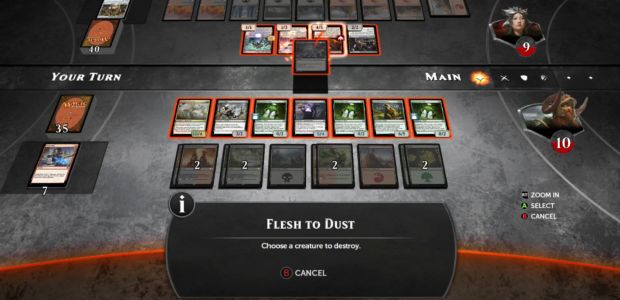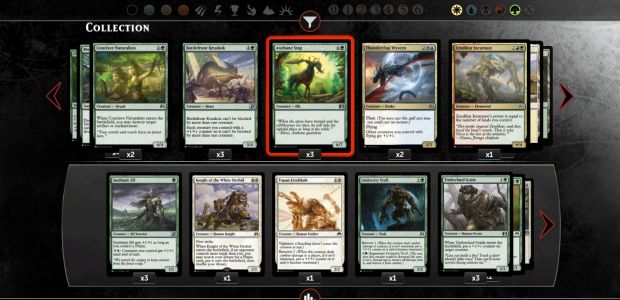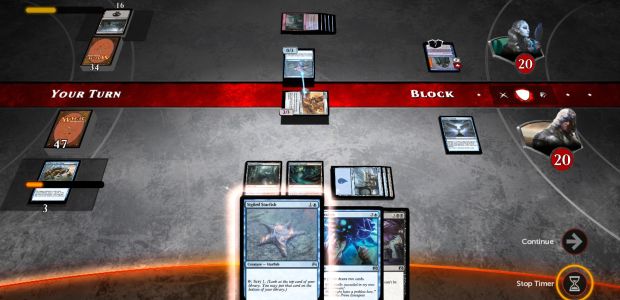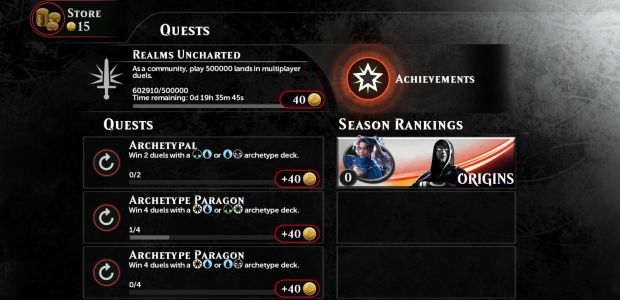Impressions: Magic Duels - Origins
Free Magic or an illusion?
I've been playing Magic regularly for the past five years, and the blame for all that lost time and money is the first Duels of the Planeswalkers [official site]. During that time, the game grew from gateway drug for its cardboard cousin into a full series in its own right, and one looked forward to by long-time fans and new players alike. Unfortunately last year's edition did almost as much work making me hate it as the original did making me love it. I've been playing the next iteration, Magic Duels Origins, to find out whether it manages to fix the series amid the move to an ever-updating free to play model, or whether it falls into the same trap (cards) all over again.
Of course, the answer is a little from deck A, a little from deck B. To get it out of the way early, I think Magic is one of the best games ever made. I'm writing this with a horrible dose of nerd-flu, having come back from a full weekend of playing five separate Magic tournaments at a local basement-turned-store. I don't regret it for a second because I get an unmatched amount of fun from watching the systems of Magic interact, devising the correct plays from twenty different bits of information spread across a half hour game and half a decade of learning. The art is immaculate and brings each addition to the game to life, be they subtle rule changes, twists on old cards or entire new card types. I've made new friends, developed rivalries, and through some intense wheeling and dealing even managed to reduce the cost of playing to almost zero.
If you don't play Magic, I think you should. If you want to, Duels is where you should start.
This iteration's attempts to educate new players are the best they've ever been. There's no lengthy tutorial, you're just kicked into the game and things are explained as they come up. The basics of playing lands - cards that provide you resources - and casting spells - the actual business bits that kill your opponents - are covered immediately and then everything else is left to be discovered. Each time a new card type or ability is introduced, there'll be a pop up explaining it. Most also give you a 'skill quest,' a sixty-second minigame that quickly explains what it is and then gives you a scenario where it's vital to victory. This is rarely more than half a turn of actually doing something, but it's a lot better than just throwing the info at you and hoping for the best. They're also optional, but reward you with in-game currency.
Gold, or "Nicol's Bolas Bucks" as I christened them, can be used to buy card packs containing three common cards, three uncommons and one rare/mythic. It's 150 gold per pack and you end up with about 10 packs worth after you've finished the story component. Currently this and foiling cards (a cosmetic effect that adds an animation to the art) are the only things to spend gold on, but Duels now being a platform rather than a yearly release means this can and will expand in the future. At the very least there will be a whole new set of cards released in tandem with the next Magic set, Battle For Zendikar, in early October.
But hopefully it will be more than that. I spoke to Wizards EU Community Manager Dan Barrett (no relation) about what could be added:
It's possible we'll add more play modes in the future. A lot of this is going to come down to what our Magic Duels community says they want to see. So if they say 'we want a different multiplayer mode and that's the number one thing we wanna see' then that's going to be bumped up our list of priorities. We have a list that's miles long of potential features we could add, so it's a case of picking the ones that are going to benefit most the community of people playing the game.
Right now the game has only one on one battles and Two Headed Giant (two versus two) modes, lacking my personal favourite of Sealed and the well received Planechase and Archenemy modes from previous years. Sealed gives you a pool of cards to build a deck from, while Planechase is large multiplayer games with additional rules in place controlled by a seperate deck and Archenemy is an all versus one mode, with the one starting on more life and given a deck of scheme cards that even the odds. These more random modes aren't for me, but they were what kept a healthy non-competitive playerbase interested.
What Origins does have is its campaign mode, which is far and away the best the series has offered. It's focused on the five main characters of Magic, each representing one of the colours of cards. As you may have guessed, the stories focus on their origins told through sets of five matches, with your pre-configured deck upgrading between them. While free deckbuilding is the obvious right call for the multiplayer side of things, using the campaign as a way to introduce playstyles and each colour's identity is important not only as a teaching tool, but also to provide variation and allow more specific encounter design. The nature of Magic means any deck could technically brute force its way through any challenge. This means players (or, at least, me) will inevitably do that instead of trying to redesign their deck around beating that opponent, even as the encounter becomes steadily more frustrating to retry. That Stainless instead control what cards you have access to at any given moment makes for a better experience.
It means cards can also be introduced at story-relevant points, then read by players and reacted to or played on the fly. It encourages some core tenets of Magic - learning by doing and using all the information at your disposal to make decisions - better than ever before. This in turn makes room for more advanced plays, even in the slightly simplified version of the priority and phases system Duels uses that lets you respond to your opponents actions only in certain time limits. It doesn't teach you that, it just lets you put the pieces together yourself, while providing the never-wrong guiding hand of rules knowledge that real-world Magic can sorely lack.
Unfortunately, it also suffers from two old problems. The first is that while total customisation isn't required, it would be nice to be able to tailor each deck to my way of thinking. Rather than simply adding cards to it, I'd want each win to give me options to focus on specific areas or cut one avenue of attack to make room for another, similar to the precons of Duels 2013 and before. Basically, I don't like playing with bad cards and I expect newer players would prefer to cut the ones they don't like too, even if we disagree on which those are.
On a similar angle, Origins continues a series-long habit of giving my computerised opponents far cooler decks and scenarios than me. One might start on a higher life total with the only intended method of victory being to run him out of cards to draw (I still beat him to death because that's how I roll) while another is actually a series of four encounters with different demons, each keeping the board position of the one before it. They even have unique cards not available in the deckbuilding portion of the game. My CPU doesn't care how cool these cards are and I do, so give them to me, even if it's just for the campaign.
That other portion is where you get to use any cards or colour combos you like, building your own decks and challenging the AI or taking on human opponents online. If you're thinking of Hearthstone, well, so were the developers. Every win gets you some amount of gold, with the most rewarded for online play and then scaling with AI difficulty. There's a cap of 400 a day, which compares pretty favourably with Hearthstone's 100, although requires fewer wins to meet at 20 vs. Blizzard's 30. If you'd rather pay out, thanks to the way packs work (you'll never open cards you already have a playset of) it's around £40 to buy enough gold to get the full set, with no variation if you've bad pack-luck. Again, this compares pretty well to many other F2P games that would cost hundreds to complete, but will drop off as more sets are released with just as many cards to buy. Plus, as Dan said, there may be additional play modes or new campaigns too.
There's also a few bugs currently plaguing the iOS and pre-release copies of the game. Daily quests, which offer bonus gold and keep things fresh, aren't completing unless Wizards' noobie-friendly deck-helper tool is used. This isn't a huge problem since the tool is reasonably effective at creating a playable deck, but is compounded by being unable to edit those decks in the expert builder that gives full control - a baffling decision that I can only assume is another bug. I also had a desync issue in one of the few online games I played, causing the game to soft-lock and requiring me to restart the client. As with any online release, servers are unlikely to be fully stable at launch, but playing the AI, deckbuilding and running the campaign all work offline.
If you do manage to get past those issues and get a collection together, you'll find Origins' AI isn't any improved from yester-years, but has been given far more powerful decks to play with. With purely free cards I found I was outmatched on card quality, meaning deckbuilding and play strategy actually mattered. Going online, this is less likely to be much of a problem unless you're unlucky enough to go up against only people who have decided to buy the set. Even then your disadvantage is limited due to how many of each card Duels allows to be put into decks.
This is something my opinion has wavered on, but I think I now understand it. In paper Magic, you're allowed four of any card in your deck, other than basic lands and cards that specifically say this rule doesn't apply to them. In Duels, you're allowed four of any common, three of any uncommon, two of any rare and only one of each mythic. While it's not strictly true, in general this is also the scale of card power. A change like this in paper Magic would be both a massive upheaval of two decades of normality and require a total rethink as to how cards, particularly rares, are designed. In Magic's 60 card decks, a one- or two-of that can only be naturally drawn is just not reliable enough to build a strategy around.
However, in Duels they can get around this problem via the selection of cards they choose to put in. It's also a benefit in basically quartering how long it will take to build a full collection, helps keep cries of pay to win - which, for what it's worth, Magic is, just not as much as you might think - to a minimum and creating a different experience to the world of fleshy hands and cardboard, uh, cards. Remember, this is a companion to and introduction for that game, not something designed to replicate or replace it. Magic The Gathering Online, Wizards' other digital attempt, fulfills that role and comes with its own massive selection of headaches.
What's not so great on the collection front is servers between iOS, PC, Xbox and eventually PS4 not being linked. As much as we'd love to believe your gaming heart is set only here, we've seen you round the back of the bikesheds with your iPad and Dualshock. But having to re-earn (or buy) all those cards again isn't the way to make you happy. Hearthstone partially succeeds on the back of being able to rank up between drinks at the local or while on the bus, then get home and open the packs you've earned. Currently, Duels doesn't have that and it will suffer for it. There's also the issue of a split player base leading to depopulated servers, but in its current pre-launch state I can't make a final judgement on how much of a problem that will be. Either way, crossplay should absolutely be at the top of Stainless' priority list.
I think Origins has the chance to be everything Wizards want out of the digital version of their greatest work, but the fixed release date to coincide with a real world release has clearly left some polish in the can. The game itself is solid, controls better and has a far superior UI to any other version, even if some mechanics in-game can get a little fiddly. You'll mess up once and hopefully it won't matter or will be against the AI, then you'll know for next time. Dan put it best in our interview:
The reason it's moved to this free to play model is so we can do this persistant ongoing client and because people have said 'wouldn't it be awesome if there was free to play Magic?' and we've said '... yes it would.'
And when it has more cards and formats and all the bugs are cleared out, it will be awesome. As I noted in my thoughts on Hex, it's also in desperate need of sideboarding, where fifteen additional cards are brought to matches and can be swapped out with ones in your deck between games, which are best two out of three. All the card selection and slight rules changes in the world don't take the (needed) variance out of Magic and I know it's another layer of stuff-to-learn for new players, but it improves the game immeasurably. Having this depth in normal ranked games would also give it the push it needs to stand up to Hearthstone - something that's unlikely currently, but must surely be a target.
Beyond that, it's good to see Duels back to its old quality self and surviving the transition to free to play intact. I'll certainly be checking in with it just as often as I do with the real game. I wasn't doing anything with that little remaining free time anyway.
Magic Duels: Origins will be out soon, apparently, on Steam. It doesn't have a store page yet. Try here.





